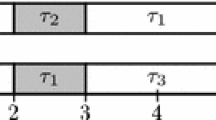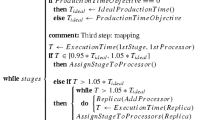Abstract
In the past years a vast amount of work has been done in order to improve the basic scheduling algorithms for master/slave computations. One of the main results from this is that the workload of the tasks may be adapted during the execution, using either a fixed increment or decrement (e.g. based on an arithmetical or geometrical ratio) or a more sophisticated function to adapt the workload. Currently, the most efficient solutions are all based on some kind of evaluation of the slaves’ capacities done exclusively by the master. We propose in this paper the Adaptive Time Factoring scheduling algorithm, which uses a different approach distributing the scheduling between slaves and master. The master computes, using the Factoring algorithm, a time slice to be used by each slave for processing, and the slave predicts the correct workload size it should receive in order to accomplish this time slice. The prediction is based on a performance model located on each slave which is refined during the execution of the application in order to provide better predictions. We evaluated the proposed algorithm using a synthetic testbed and compared the obtained results with other scheduling algorithms.
This research was done in cooperation with HP-Brazil.
Preview
Unable to display preview. Download preview PDF.
Similar content being viewed by others
References
Chronopoulos, A.T., Andoine, R., Benche, M., Grosu, D.: A class of loop self-scheduling for heterogeneous clusters. In: Proceedings of CLUSTER 2001 (2001)
Kruskal, C.P., Weiss, A.: Allocating independent subtasks on parallel processors. IEEE Transactions on Software Engineering 11(10), 1001–1016 (1985)
Polychronopoulos, C.D., Kuck, D.J.: Guided self-scheduling: A practical scheduling scheme for parallel supercomputers. IEEE Transactions on Computers 36, 1425–1439 (1987)
Hummel, S.F., Schonberg, E., Flynn, L.E.: Factoring: A method for scheduling parallel loops. Communications of the ACM 35, 90–101 (1992)
Hummel, S.F., Schmidt, J.P., Uma, R.N., Wein, J.: Load-sharing in heterogeneous systems via weighted factoring. In: Proceedings of the 8th Symposium on Parallel Algorithms and Architectures (1997)
Banicescu, I., Velusamy, V.: Performance of scheduling scientific applications with adaptive weighted factoring. In: Proceedings of the International Parallel and Distributed Processing Symposium (IPDPS 2001) - Heterogeneous Computing Workshop, San Francisco (2001)
Banicescu, I., Johnny Devaprasad, V.V.: On the scalability of dynamic scheduling scientific applications with adaptive weighted factoring. Cluster Computing: The Journal of Networks, Software Tools and Applications 6, 213–226 (2003)
Banicescu, I., Liu, Z.: Adaptive factoring: A dynamic scheduling method tuned to the rate of weight changes. In: Proceedings of the High Performance Computing Symposium (HPC 2000)ac, Washington, pp. 122–129 (2000)
Banicescu, I., Velusamy, V.: Load balancing highly irregular computations with the adaptive factoring. In: Proceedings of the IEEE - International Parallel and Distributed Processing Symposium (IPDPS 2002) - Heterogeneous Computing Workshop, Fort Lauderdale (2002)
Press, W.H., Flannery, B.P., Teukolsky, S.A., Vetterling, W.T.: Numerical Recipes in C: The Art of Scientific Computing, 2nd edn. Cambridge University Press, Cambridge (1993)
Beaumont, O., Legrand, A., Robert, Y.: Scheduling divisible workloads on heterogeneous platforms. Parallel Computing 29, 1121–1152 (2003)
Author information
Authors and Affiliations
Editor information
Editors and Affiliations
Rights and permissions
Copyright information
© 2005 Springer-Verlag Berlin Heidelberg
About this paper
Cite this paper
Ferreto, T., De Rose, C. (2005). Scheduling Divisible Workloads Using the Adaptive Time Factoring Algorithm. In: Hobbs, M., Goscinski, A.M., Zhou, W. (eds) Distributed and Parallel Computing. ICA3PP 2005. Lecture Notes in Computer Science, vol 3719. Springer, Berlin, Heidelberg. https://doi.org/10.1007/11564621_26
Download citation
DOI: https://doi.org/10.1007/11564621_26
Publisher Name: Springer, Berlin, Heidelberg
Print ISBN: 978-3-540-29235-7
Online ISBN: 978-3-540-32071-5
eBook Packages: Computer ScienceComputer Science (R0)




